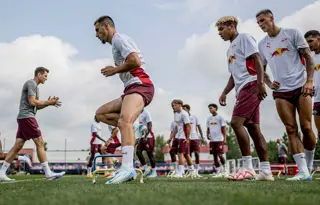Foresight
Why the match calendar is hindering high-performance and threatening player health

By Dr Darren Burgess
The sustained performance of football’s key participants - the players - is fundamental to the global success of the sport. Surprisingly, this message continues to be ignored or undervalued by those in charge of governing the game.
High-performance directors and coaches work closely with players on a daily basis, playing a small but significant role in supporting them to reach their maximum potential. This work, however, is being undermined by those trusted with managing the match calendar and organising competitions.
Calendar Congestion Stressors
Players are now being engulfed by expansion of the match calendar, with both club and international matches occurring in every month of the year. Alarmingly, the fixture congestion is set to expand further, so that tournaments, and preparations necessary for performing well in them, will begin to overlap with each other.
The expanded club competition formats of the FIFA Club World Cup and the UEFA Champions League, for example, alongside expanded national team competitions, such as the FIFA World Cup and UEFA Nations League, will lead to a greater number of games played by the leading players in the game. Significantly, these expanded tournament formats, as well as the recent introduction of additional international club competitions, such as the UEFA Conference League, means more footballers will be exposed to greater match demands and therefore face greater auxiliary stressors, including travel fatigue, mental stress, injury risk, and more.

Challenges and Risks
For high-performance and medical staff charged with maintaining players’ mental and physical fitness, this presents a substantial challenge. In the recent past, for example, congested club seasons were followed by 4-5 weeks of player downtime, allowing players to fully recover.
This ‘off-season’ period is now consumed with important international tournaments, usually involving substantial travel and always performed in a high-stress environment. Shortened off-season breaks not only mean less recovery, but also less training time and therefore less preparation time for subsequent domestic competitions.
High-performance staff are left to manage residual player fatigue – both mental and physical – while attempting to physically prepare players within a dangerously limited pre-season period. This cycle continues throughout the traditional season with domestic leagues overlapping with cup competitions, continental tournaments, and national team fixtures.
These scenarios undoubtedly result in increased risk of reduced performance, and possibly an increased risk of injury to players as a result of cumulative fatigue. In the absence of regulations safeguarding player health, the burden inevitably falls on the management and coaching staff to protect the welfare of these players. In turn, this becomes a difficult task, with increasing competitive scrutiny on managers and intense competition for selection amongst a host of factors that often lead to player participation, even at the expense of player health and performance, becoming the priority.
High-performance staff are left to manage residual player fatigue – both mental and physical – while attempting to physically prepare players within a dangerously limited pre-season period.
HPAN and PWM Metrics
Earlier this year, the FIFPRO High-Performance Advisory Network (HPAN) was established as the latest component of Player IQ, FIFPRO’s knowledge centre. As the inaugural HPAN Chairman, I’ve been delighted with the enthusiastic engagement of the group members thus far, both during working meetings and when participating in external industry events. Their wealth of experience across different regions, environments and sports will enable us to provide valuable insights and support the FIFPRO team in their work.
FIFPRO Player Workload Monitoring (PWM) has also recently introduced new metrics in the latest development of the PWM tool, which tracks the match load, rest, recovery and travel of players across the globe. One such metric, is ‘Squad Utilization’ to assess the impact and frequency of player rotation across selected clubs and leagues.
Despite extended squads, FIFPRO’s analysis demonstrated that, on average, across clubs in professional French and Portuguese leagues, eight players were responsible for 50 percent of total game time, with the remaining squad members completing the other 50 percent. Therefore, while adjustments to squad or subs match rules may have some effect on less established players, a club’s core group of players will remain largely unaffected and subject to the same workload demands.
Regulation of player match load might well be the best way of effectively managing the workload of these players and alleviating competitive pressure on the decision-making of management and coaching staff.
Men's Player Workload Monitoring Platform

‘Managing’ players with spots on the bench is one such option, however this still exposes players to travel, physical preparation, match stress and possibly late nights with disrupted sleep depending on fixture timing. Whilst in this scenario matchday minutes might be low, there is undoubtedly additional stressors placed on substitute players that has been previously unquantified. FIFPRO PWM recently introduced the ‘Matchday Squad Inclusions’ metric to capture this information and research into this area is ongoing.
The third new PWM metric that I’d like to mention is perhaps the most revealing. Utilising the knowledge and expertise of players, coaches and unions, the ‘Working Time’ breakdown of selected players has also been integrated into the recent PWM research. During my time with the Socceroos, I experienced first-hand the commitment required of national team players, particularly those who played their club football on a different continent.
The physical and mental toll of consecutive weeks in camp, long-distance travel, dramatic changes in climate, and major tournament pressures are considerable. In tandem, the importance of rest, both during the season and over the off-season, remains vitally important and this new metric highlights the scarcity for many leading players.
Looking Ahead
High-performance staff have never been more challenged: to gather and analyse information on players relating to on and off-field stress; to advise both players and managers on player fitness and availability; to protect player welfare; and to ensure their readiness to perform. Unfortunately, the current global football calendar is simply not synonymous with these goals and a better collective solution is urgently required.
Dr Darren Burgess
Dr Darren Burgess is currently the High-Performance Manager at Adelaide Football Club. He is also the Chair of the FIFPRO HPAN, having acted as a Senior Advisor on Player Workload, Health & Performance over recent seasons. Darren’s prior experience includes senior performance roles at Arsenal, Liverpool, the Australian Men’s National Team and Melbourne AFL.

